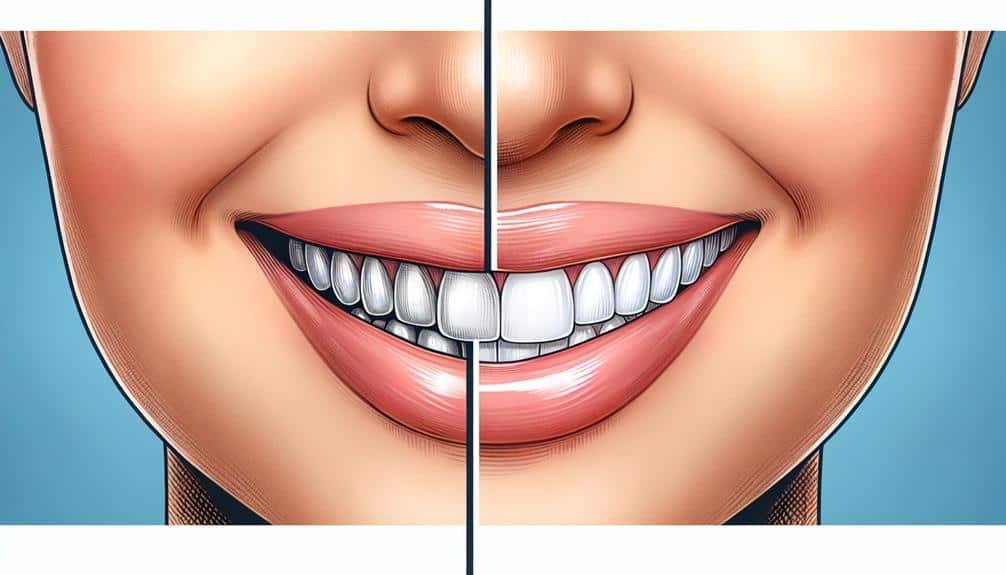You can achieve a brighter smile safely by following key steps. Consult your dentist to prevent sensitivity and choose the right whitening option. Maintain good oral hygiene, avoid teeth-staining foods, and consider a teeth-friendly diet. The process involves discussing desired whitening levels and selecting home remedies or professional treatments. Manage sensitivity post-treatment with desensitizing toothpaste and proper care. Celebrate your radiant smile confidently with effective whitening techniques that deliver noticeable before and after results.
Key Points
- Consult with a dentist for safe whitening recommendations.
- Use desensitizing toothpaste before and after treatment.
- Follow post-whitening care instructions diligently.
- Avoid hot and cold foods to manage sensitivity.
- Maintain good oral hygiene for long-lasting results.
Understanding Sensitive Teeth and Whitening
If you experience sensitivity in your teeth, whitening treatments may require special considerations to guarantee a comfortable and effective outcome. Sensitivity prevention is important when undergoing teeth whitening procedures. Before starting any whitening treatment, it's essential to consult with your dentist to assess the cause of your sensitivity. Your dentist may recommend desensitizing toothpaste or fluoride treatments to prepare your teeth for whitening.
Additionally, choosing the right whitening option is essential to minimize sensitivity. Whitening options such as professional, in-office treatments or at-home whitening kits with lower concentrations of bleaching agents can help reduce sensitivity while still achieving desired results.
When opting for teeth whitening, it's important to take precautionary steps to prevent or minimize any potential sensitivity that may arise during or after the treatment. By following these guidelines and selecting the appropriate whitening method, you can enhance your smile without compromising your comfort or dental health.
Preparing for Teeth Whitening Treatment
To prepare for a teeth whitening treatment, consult with your dentist to determine the most suitable approach for achieving best results while minimizing sensitivity. Maintaining good oral hygiene is essential before undergoing teeth whitening. Brushing and flossing regularly will help remove plaque and guarantee that the whitening treatment is applied to clean teeth, maximizing its effectiveness.
Additionally, consider making diet modifications to support the whitening process. Avoiding foods and drinks that can stain your teeth, such as coffee, tea, red wine, and berries, can help prolong the effects of the whitening treatment. Opt for a teeth-friendly diet rich in fruits and vegetables that can naturally help scrub away surface stains.
The Process of Teeth Whitening
When undergoing a teeth whitening procedure, your dentist will typically start by examining your teeth and discussing your desired level of whitening. This initial assessment helps determine if you're a suitable candidate for teeth whitening and allows the dentist to tailor the treatment to meet your specific needs. There are two primary methods for teeth whitening: home remedies and professional treatments. Home remedies include over-the-counter whitening toothpaste, whitening strips, and trays. These options are convenient but may not provide as dramatic results as professional treatments.
Professional treatments, on the other hand, are performed in a dental office by a qualified dentist. Common professional whitening methods include in-office bleaching and at-home whitening kits provided by your dentist. In-office procedures often involve the application of a high-concentration bleaching agent combined with advanced technologies to accelerate the whitening process. Your dentist will guide you on the best treatment option based on your teeth's condition and your desired outcome. Remember, consulting with a dental professional is vital to achieve safe and effective teeth whitening results.
Managing Sensitivity After Whitening
After undergoing a teeth whitening procedure, it's important to address and manage any sensitivity that may arise as a result of the treatment. Sensitivity management is vital for a comfortable post-whitening experience. Here are some tips to help you manage sensitivity and care for your teeth effectively:
- Use desensitizing toothpaste: Opt for a toothpaste specifically designed to alleviate sensitivity. These toothpastes contain ingredients like potassium nitrate or fluoride that can help reduce sensitivity over time.
- Avoid hot and cold foods: After whitening, your teeth may be sensitive to extreme temperatures. Stick to lukewarm foods and beverages to prevent discomfort.
- Follow post-whitening care instructions: Your dentist will provide you with specific post-whitening care guidelines. Follow these instructions diligently to guarantee the best results and minimize any sensitivity you may experience.
Celebrate Your Brighter Smile
Embrace the radiance of your enhanced smile and revel in the newfound confidence it brings. Your smile speaks volumes about you, conveying warmth, approachability, and self-assurance. Now that you have achieved a brighter smile, it's time to smile confidently and share your joy with the world.
A radiant smile not only enhances your facial aesthetics but also boosts your self-esteem. Research shows that smiling can elevate your mood and even positively impact those around you. By celebrating your brighter smile, you aren't only embracing a physical transformation but also nurturing your mental well-being.
When you smile confidently, you exude positivity and create a welcoming atmosphere in your interactions. Whether it's at work, social gatherings, or everyday encounters, your enhanced smile can leave a lasting impression. Share joy with others by flashing your brighter smile, spreading happiness wherever you go.
Frequently Asked Questions
Can Teeth Whitening Treatments Be Done on Crowns or Veneers?
Looking to brighten your smile with teeth whitening treatments but wondering about crowns or veneers? Crowns are not affected by whitening, while veneers can't be lightened. Be cautious and consult your dentist for the best approach.
How Long Should I Wait Before Drinking Coffee or Red Wine After a Teeth Whitening Treatment?
After a teeth whitening treatment, it's essential to take precautionary measures. Dentists often recommend waiting 24-48 hours before consuming coffee or red wine. This wait time helps preserve the whitening effects and prevents staining, especially on dental restorations like crowns or veneers.
Are There Any Long-Term Effects of Teeth Whitening on Tooth Enamel?
To protect enamel and guarantee longevity after teeth whitening, consider sensitivity management and precautionary measures. Regular dental check-ups, fluoride treatments, and using desensitizing toothpaste can help maintain enamel health.
Can Teeth Whitening Treatments Help With Intrinsic Stains Caused by Medication or Genetics?
Teeth whitening treatments can effectively address intrinsic discoloration caused by medication or genetic factors. By targeting deep stains, these treatments can help brighten your smile. Consult a dental professional for the best approach.
How Often Should I Touch up My Teeth Whitening Treatment to Maintain Results?
To keep your teeth whitening results, touch up every 6-12 months. This frequency guarantees ongoing benefits and helps prevent discoloration. Consistent touch-ups, along with good oral hygiene, are essential for long-lasting brightness and effective maintenance.



